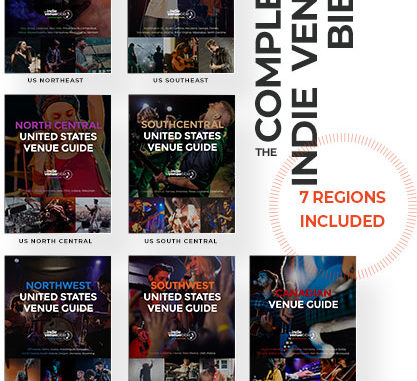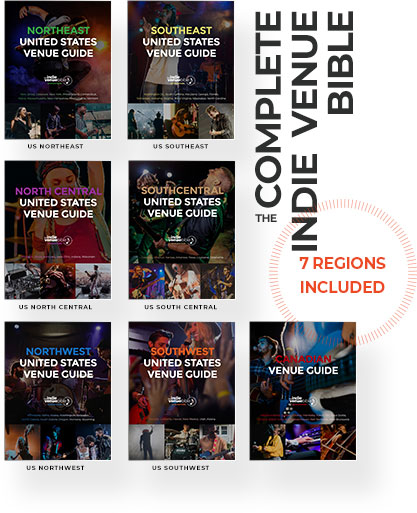
One of the biggest struggles for independent artists is drawing an audience. Artists put a lot of time and effort into writing and recording music with the hopes that more than just their family and friends will hear it. Social media has helped in that regard by giving artists various platforms to showcase their talent.
Social media has been responsible for many of the new artists reaching the masses today. A chance viral hit can bypass a lot of the grind that an independent artist needs to do to build a fan base. If you’re adept at utilizing social media that’s one way to go. Social media has been a great tool for independent artists and the music industry in general. Still, there should be more avenues and tools taken advantage of to reach the people that you’d like to reach.
Even with a strong following on social media, artists still need to get on stages. For independent artists hunting down and locating various venues or events in your genre can be an arduous task. Luckily today it is easier than ever before to find venues to reach out to.
A staple of an independent artist’s arsenal for years has been the multiple offerings by the Indie Bible. The Indie Bible has several directories available for artists to use to get shows, publicity, or to find booking agents. The Complete Indie Venue Bible is a directory of thousands of places where independent musicians might be able to find stages to perform on. According to the Indie Venue Bible, within their pages are listings for “music venues, festivals, colleges, concert series, bars, coffee shops, restaurants, house concerts, theaters, clubs, halls, churches and book stores” separated into six regions within the United States and a 7th directory covering all of Canada.
Coverage
The purchase of the Indie Venue Bible includes seven PDFs, each corresponding to the different regions they have categorized. The United States is broken up into the North Central, the Northeast, the Northwest, the South Central, Southeast, and the Southwest regions. The whole of Canada is a file in itself.
Listings
Indeed, there is a massive number of listings contained within the Indie Venue Bible. If you’re an independent artist looking to book a tour on your own, there are more than enough venues listed here to get you on the road in whichever region you are in or want to go to.
Each listing includes the city name, location name, and URL to the listing’s homepage. From there you have to do some legwork and reach out to each venue individually to try to book a gig at their spot. That being said, having all of these potential stages at your disposal takes a huge amount of work off of your back.
Keeping this massive amount of information updated is undoubtedly an issue. Venues close and events stop all the time. The contact information can change within the year that these directories are released. On the fifth page of each file, there is a notice asking for help in keeping the directory up-to-date by contacting them whenever you find an out of date listing. There’s even an incentive for you to do so. The Indie Venue Bible has a monthly drawing for the Shure SM 58 microphone for help in keeping the listings fresh. Each update gives you one entry in the drawing. I’m curious to know if they constantly update the listings as per the feedback throughout the year, as the first listing I clicked on for a concert series in New York led to a website that seems to have stopped operating in 2015. Still, 27 out of the 30 random venues I clicked on across all the directories were valid. I’m still looking forward to getting my microphone though.
One change I’d like to see with the listings is the destination links for colleges and government sites. Both may have music events and do booking for various functions however linking to the top level of the homepage can make it very difficult to find the section that pertains to the events on such large websites with heavily nested pages. I prefer to see a link that takes you to either that event page or the contact page for the events.
Tags
Visually, at first, the tags can seem a bit confusing. Following each listing, there are colored genre tags indicating which types of music that venue or festival caters to. However, those tags are the key to finding what you’re looking for in the genre of your choosing. For example, to find venues in the Northeast that work with Hip Hop artists, which includes states like New York, New Jersey, Massachusetts, I could open the Northeast directory and simply do a text search for “Hip Hop” and bypass all of the confusion. I can see the necessity for the multiple colored tags but even still, it’s not the prettiest thing to look at. It sort of reminds me of old 90s ASCII chat rooms or bulletin boards.
Categorization by State and City
The directory has each of the states within the region separated and linked to from a central menu. So, if you’re looking for venues in New York you would just click on New York and it would jump to the New York section of the Bible. They have further categorized cities and towns within each state and each has links that will take you directly to the section where venues for that city are listed.
Included in the Indie Venue Bible folder was also The Ultimate Guide to Booking Gigs, which is a massive collection of articles about touring that spans over 260 pages.
The Indie Venue Bible is available as a standalone purchase but also as a part of the Ultimate Indie Bundle which combines the Indie Bible, the Indie Bible online database, The Indie Venue Bible, and the two bonus guides The Ultimate Guide to Promoting Your Music and The Ultimate Guide to Booking Gigs at a significantly reduced cost.
The wrap up
The Indie Venue Bible is what it says it is – a massive bible of thousands of performance outlets. It is undoubtedly the product of an incredible amount of work. As excellent a tool as it is, there are a few flaws. Sometimes the formatting is a bit random. For example, on the state listing pages, the text seems to be using different fonts for each state and some state names are in all capitals while others only have the first letter of the state name in caps. The images for each state are quite lo-res and blurry at times. And of course, there is the problem of outdated links; which is unavoidable. Still, the amount of work saved by not having to accumulate these listings on your own outweighs a few minor issues. By and large, the Indie Venue Bible would be a big asset to independent artists looking to book their own tours to promote themselves and their music.
This article contains affiliate links.



Leave a Reply